高级英语写作2
高级英语写作2argumentation
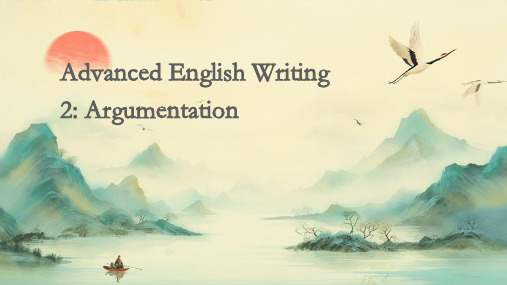
Inductive Argumentation
归纳论证
从个别事例中推导出一般结论的推理过程。
特点
基于观察、经验和证据,逐步推导结论。
例子
通过观察一组数据,发现某种趋势,从而得 出结论。
Interpretation
解释论证
对某个观点、文本或事件进行深入分析和解释,以证 明其合理性的推理过程。
特点
需要深入挖掘信息,理解背景和语境,提供全面解释。
I will seek opportunities to write and receive feedback on argumentative essays, focusing on areas where I need the most improvement.
01
introduction
Theme Introduction
Theme
Argumentation in Advanced English Writing
Description
This course focuses on the art of persuasive writing, including the structure, logic, and language of argumentation.
要点二
Key Concepts
Important concepts such as the use of logical fallacies and the development of counterarguments were thoroughly explained and discussed.
Building Argumentation Structure
高三英语作文必修二
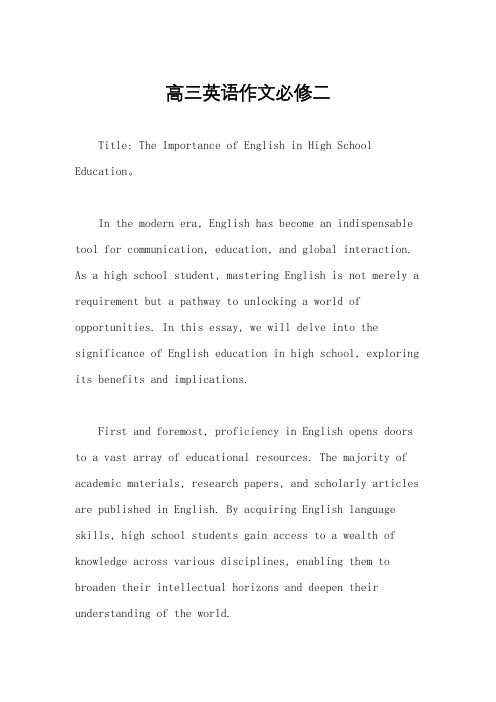
高三英语作文必修二Title: The Importance of English in High School Education。
In the modern era, English has become an indispensable tool for communication, education, and global interaction. As a high school student, mastering English is not merely a requirement but a pathway to unlocking a world of opportunities. In this essay, we will delve into the significance of English education in high school, exploring its benefits and implications.First and foremost, proficiency in English opens doors to a vast array of educational resources. The majority of academic materials, research papers, and scholarly articles are published in English. By acquiring English language skills, high school students gain access to a wealth of knowledge across various disciplines, enabling them to broaden their intellectual horizons and deepen their understanding of the world.Furthermore, English proficiency is a prerequisite for higher education and professional success. Manyuniversities worldwide, especially those renowned for their academic excellence, require applicants to demonstrate proficiency in English through standardized tests such as the TOEFL or IELTS. Moreover, in an increasingly interconnected global economy, English has emerged as the lingua franca of business and commerce. Proficient English speakers have a competitive edge in the job market, as they can effectively communicate with colleagues, clients, and partners from diverse linguistic backgrounds.In addition to academic and career benefits, English proficiency fosters cultural exchange and mutual understanding. Through literature, films, and other forms of media, students gain insights into different cultures, traditions, and perspectives. They develop empathy and tolerance, which are essential qualities in today's multicultural society. Moreover, by engaging in cross-cultural communication, students can forge meaningful connections with people from around the world, fosteringmutual respect and cooperation.Despite its undeniable importance, English education in high school faces certain challenges. Limited resources, outdated teaching methods, and insufficient teachertraining can hinder students' progress in acquiring English language skills. To address these challenges, educatorsmust adopt innovative teaching strategies that cater to diverse learning styles and utilize technology to enhance language learning experiences. Professional development programs should be implemented to empower teachers with the necessary skills and knowledge to effectively teach English as a second language.Moreover, promoting a conducive learning environment is crucial for fostering English proficiency among high school students. Schools should provide ample opportunities for students to practice their English skills through extracurricular activities such as debates, public speaking contests, and language immersion programs. Additionally, integrating English language learning into various subjects, such as science, history, and social studies, can reinforcelanguage acquisition and demonstrate the practical applications of English in real-world contexts.In conclusion, English education plays a pivotal role in high school curriculum, offering students a pathway to academic success, professional advancement, and cultural enrichment. By equipping students with English language skills, educators empower them to thrive in an increasingly interconnected and multicultural world. However, addressing the challenges facing English education requires concerted efforts from policymakers, educators, and stakeholders to ensure that all students have access to quality English instruction and opportunities for linguistic and cultural exchange. Through collaborative efforts, we can pave the way for a brighter future where English proficiency is not just a skill but a gateway to endless possibilities.。
高二级英语作文八篇模板
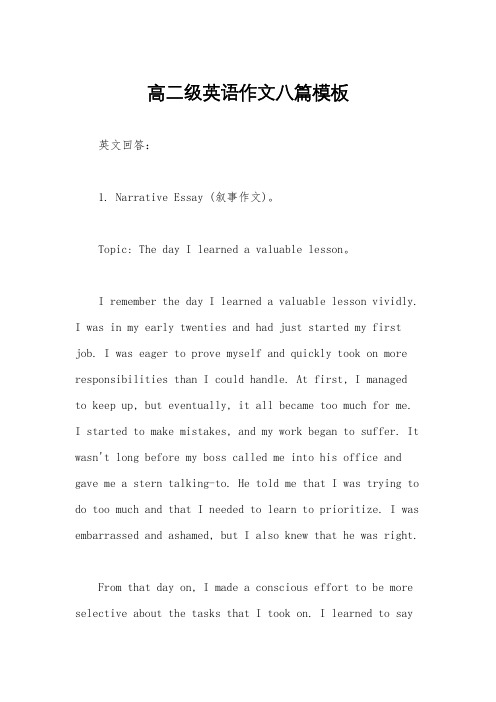
高二级英语作文八篇模板英文回答:1. Narrative Essay (叙事作文)。
Topic: The day I learned a valuable lesson。
I remember the day I learned a valuable lesson vividly.I was in my early twenties and had just started my first job. I was eager to prove myself and quickly took on more responsibilities than I could handle. At first, I managed to keep up, but eventually, it all became too much for me.I started to make mistakes, and my work began to suffer. It wasn't long before my boss called me into his office and gave me a stern talking-to. He told me that I was trying to do too much and that I needed to learn to prioritize. I was embarrassed and ashamed, but I also knew that he was right.From that day on, I made a conscious effort to be more selective about the tasks that I took on. I learned to sayno to things that I didn't have time for and to delegate tasks to others when necessary. As a result, my work improved, and I was able to maintain a better work-life balance.2. Persuasive Essay (议论文)。
英语二作文大作文模板
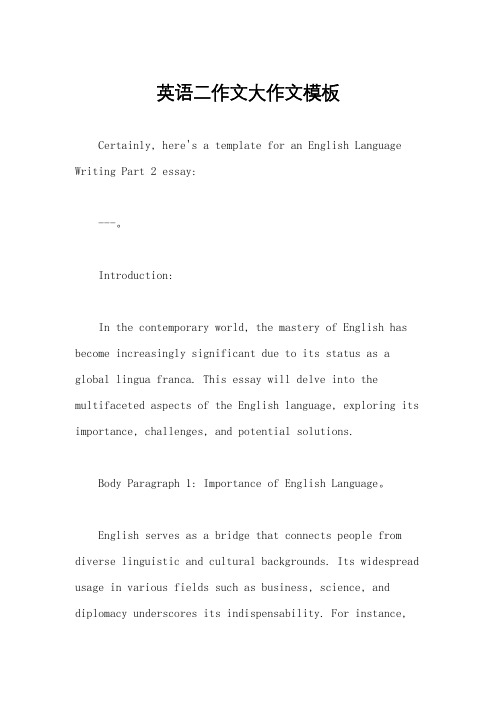
英语二作文大作文模板Certainly, here's a template for an English Language Writing Part 2 essay:---。
Introduction:In the contemporary world, the mastery of English has become increasingly significant due to its status as a global lingua franca. This essay will delve into the multifaceted aspects of the English language, exploring its importance, challenges, and potential solutions.Body Paragraph 1: Importance of English Language。
English serves as a bridge that connects people from diverse linguistic and cultural backgrounds. Its widespread usage in various fields such as business, science, and diplomacy underscores its indispensability. For instance,proficiency in English enhances opportunities for international communication, fostering global collaboration and understanding.Body Paragraph 2: Challenges Faced in Learning English。
英语二英语大作文
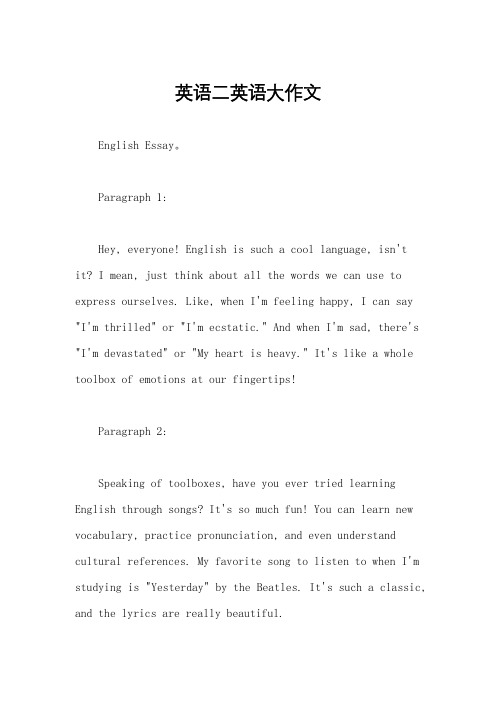
英语二英语大作文English Essay。
Paragraph 1:Hey, everyone! English is such a cool language, isn't it? I mean, just think about all the words we can use to express ourselves. Like, when I'm feeling happy, I can say "I'm thrilled" or "I'm ecstatic." And when I'm sad, there's "I'm devastated" or "My heart is heavy." It's like a whole toolbox of emotions at our fingertips!Paragraph 2:Speaking of toolboxes, have you ever tried learning English through songs? It's so much fun! You can learn new vocabulary, practice pronunciation, and even understand cultural references. My favorite song to listen to when I'm studying is "Yesterday" by the Beatles. It's such a classic, and the lyrics are really beautiful.Paragraph 3:But let's talk about movies for a moment. Watching English movies is another great way to improve your language skills. Not only do you get to hear native speakers, but you also get a peek into different cultures and ways of life. My all-time favorite movie is "The Shawshank Redemption." It's such a powerful story, and the acting is amazing.Paragraph 4:Traveling to English-speaking countries is another awesome experience. I've been to London a few times, andit's always so exciting to try and use the language in its native environment. Even if you make mistakes, people are usually very understanding and happy to help. Plus, you can try all the delicious food and explore the amazing sights!。
高级英语写作2_Argumentation汇编

m
inference
Support
Support
rather than it tells you a structure,it teaches you a way to think:well-knit(严谨)
1、it's so cold
to condemn smoking. However, although I feel that
smoking can be harmful, I do not think it should be
banned.
Claim
First, smoking undoubtedly helps many people
outside,let's have
hot pot for dinner
ok?
3、because it 's
better to eat spicy
food in cold
weather!
4、ok,let's go!
2、why do we have to eat hot pot ?
最后,他们 在一起了!
So,Noland thinks its naannies need to know how to handle these high-risk situations.
2. Chain argument
A chain argument contains more than one layers of argument.The support of the first layer becomes the claim of the second layer,which needs further support,as shown in the following:
高级英语写作unit two 作业讨论

Most everyday writing is casual. Tweets, Facebook updates, holiday cards, friendly emails —these have their own simple etiquette, and we don’t spend a lot of time thinking about them before we lick that stamp or hit send.Sometimes, though, the occasion calls for something more formal. Whether it’s a letter to your political representative about an important issue, a cover letter to a potential boss, or a business proposal letter, these require a bit more care if you’re going to be taken seriously. As a lawyer, I write many formal letters each week, and there is an art to doing it well. Here are a few points to keep in mind when you’re writing your own formal letter, whether it will go through the mail or via cyberspace.1. Understand your purpose.Why are you writing? What do you want the reader to do after reading your letter? Do you want to change her mind or convince him to take a specific action? Are you seeking forgiveness? Do you mean to complain about bad service or a faulty product? Are you tryin g to get hired? What’s the “ask”?Once you know this, you can — and should —cut everything out that doesn’t serve that purpose.2. Identify your audience.Knowing your audience helps you choose your language and target your ideas more precisely. I write differently in a letter to another lawyer than I do when the addressee is a non-lawyer executive or even an elderly “pro bono” client. In a letter to the editor, your real audience is the publication’s readers—who are they? (Keep in mind that most newspa pers are written at an 8th or 9th grade reading level.) Don’t use jargon that your reader won’t understand.3. Keep it short.Most of us endure a constant flood of written communications, and we have a limited amount of time to spend reading it. You therefore have a better chance of being read if you keep your letter to one page. A multi-page letter with long paragraphs and complex sentences looks overwhelming. The busy reader will be tempted to set it aside for when she has more time—and she might never get around to picking it up again. Use short paragraphs, short sentences, short words.4. Use simple language.It’s the writer’s job to be understood. Even if your audience is highly educated, you should avoid big words and long, complex sentences. Peopl e aren’t stupid; they’re busy. Make our job easier, and we’re more likely to give your letter the attention it deserves. Formalwriting does not require the use of big words. Don’t try to sound sophisticated; try to be clear. Use “ask” instead of “request.” Say “buy” instead of “purchase.” Instead of “enclosed herewith please find,” just say, “I’ve enclosed” or “Here is. . . .”5. Lead with the most important point.As journalists say, don’t bury your lead. Find a way to open with the idea or information that you most want your reader to focus or act on. The first paragraph might be the only one he reads, so don’t hide the “ask” in the last paragraph.6. Follow the rules.There are rules for formatting a business letter. You ignore them at your peril.7. Proofread. Then proofread again.No matter how grammatically gifted you are, errors and typos can creep in. When you think you’ve finished writing, read your piece slowly and attentively, watching for those typos. Don’t trust spellcheck. If possible, pr int a hard copy of your letter and read it—out loud—with a pen in hand, marking those typos, awkward sentences, confusing lines. If it’s really important, have somebody else read it and let you know if you’ve missed something.8. Let it cool before sending.Especially if you are writing to persuade or complain, you probably are motivated by some pretty strong feelings. Absolutely write your first draft in the white-hot heat of passion. Express your feelings. Get it all on paper. But then . . . before you print and sign, or hit send, walk away for awhile. Go do something else. Let that heat of passion cool. Then come back and re-read what you’ve written. Is it fair? Is it smart? Is it true? Is it kind? Would you regret having it read on television, in front of your boss and your grandmother? Make the changes that seem appropriate after your emotions have settled.Then, and only then, hit send.What have I missed? What is your stickiest communication challenge? Your questions and suggestions are invited.。
高级英语写作教程第二版
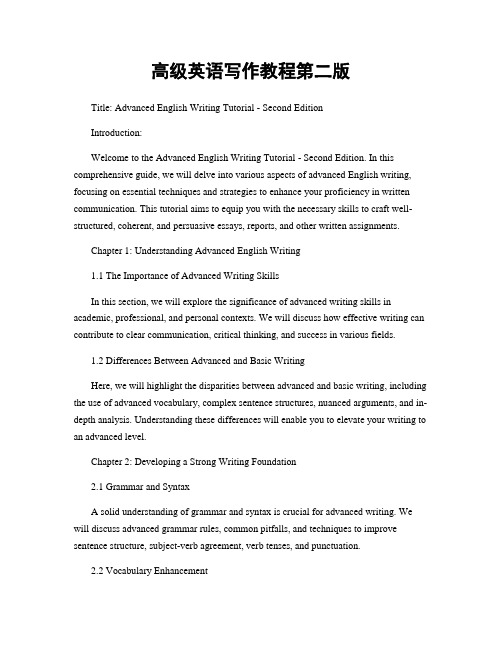
高级英语写作教程第二版Title: Advanced English Writing Tutorial - Second EditionIntroduction:Welcome to the Advanced English Writing Tutorial - Second Edition. In this comprehensive guide, we will delve into various aspects of advanced English writing, focusing on essential techniques and strategies to enhance your proficiency in written communication. This tutorial aims to equip you with the necessary skills to craft well-structured, coherent, and persuasive essays, reports, and other written assignments.Chapter 1: Understanding Advanced English Writing1.1 The Importance of Advanced Writing SkillsIn this section, we will explore the significance of advanced writing skills in academic, professional, and personal contexts. We will discuss how effective writing can contribute to clear communication, critical thinking, and success in various fields.1.2 Differences Between Advanced and Basic WritingHere, we will highlight the disparities between advanced and basic writing, including the use of advanced vocabulary, complex sentence structures, nuanced arguments, and in-depth analysis. Understanding these differences will enable you to elevate your writing to an advanced level.Chapter 2: Developing a Strong Writing Foundation2.1 Grammar and SyntaxA solid understanding of grammar and syntax is crucial for advanced writing. We will discuss advanced grammar rules, common pitfalls, and techniques to improve sentence structure, subject-verb agreement, verb tenses, and punctuation.2.2 Vocabulary EnhancementExpanding your vocabulary will enable you to express your ideas precisely and concisely. This section will provide strategies to learn new words, develop word associations, and effectively incorporate advanced vocabulary into your writing.Chapter 3: Writing Techniques and Styles3.1 Writing with Clarity and CohesionIn this chapter, we will delve into techniques to ensure your writing is clear, concise, and coherent. We will explore the use of topic sentences, transitional phrases, and logical paragraph organization to enhance the flow of your ideas.3.2 Developing a Strong Thesis StatementA strong thesis statement forms the backbone of any well-structured essay or report. We will guide you on how to formulate a clear, arguable, and focused thesis statement that effectively guides your writing.Chapter 4: Advanced Writing Strategies4.1 Critical Analysis and EvaluationAdvanced writing involves the ability to critically analyze and evaluate different perspectives, theories, and research. We will discuss techniques such as identifying bias, evaluating evidence, and providing balanced arguments.4.2 Persuasive Writing and RhetoricIn this section, we will explore persuasive writing techniques, including the use of rhetorical devices, persuasive language, and appeals to ethos, pathos, and logos. These strategies will enable you to present compelling arguments and convince your readers effectively.Chapter 5: Editing and Proofreading5.1 Polishing Your WritingEven the most proficient writers make mistakes. This chapter will provide tips on self-editing and proofreading techniques to ensure your writing is error-free and polished. We will discuss common grammatical, spelling, and punctuation errors, as well as techniques for improving clarity and conciseness.Conclusion:Congratulations on completing the Advanced English Writing Tutorial - Second Edition. By incorporating the techniques and strategies outlined in this guide, you are well-equipped to excel in advanced writing tasks. Remember, practice is key to improving your skills, so continue to write and seek feedback to refine your abilities. Best of luck in your writing endeavors!。
- 1、下载文档前请自行甄别文档内容的完整性,平台不提供额外的编辑、内容补充、找答案等附加服务。
- 2、"仅部分预览"的文档,不可在线预览部分如存在完整性等问题,可反馈申请退款(可完整预览的文档不适用该条件!)。
- 3、如文档侵犯您的权益,请联系客服反馈,我们会尽快为您处理(人工客服工作时间:9:00-18:30)。
Emerson contrast poetry and common speech. The
latter is recognized in American to be the proper
subject for the investigation of linguists who,
however, now show some incipient inclination to
• The big banquet held in honour of the distinguished guests was really neat.
---Studus Terkel
• Slang words are highly informal, vivid and interesting, but may sound offensive or funny if used inappropriatly.
• i.e.: On hearing that his father had kicked the bucket, we wrote him a letter to express our sympathies.
高级英语写作 Advanced English Writing
Lecture 2
Part one Diction
• Diction is the choice and use of words. • Learning diction can help use words in
appropriate, exact, idiomatic and interering way.
• There is nothing new in the recognition, within a
Hale Waihona Puke given language, of a distinction between common usuage and uses of the language for more restricted
investigate poetry, too, and other noncasual
utterances in a given language.
•
--C. F. Voegelin
• When I was a kid, and reading every science fiction book in the local library, I used to
I. Levels of Words
• Three types: formal, common, colloquial • Formal words: learned words, or literary
/big words; In formal writing, such as scholarly or theoretical works, political and legal documents, and formal lectures and addresses; Of Greek or Latin origin; Three or more syllables. Common words: people use everyday; in all kinds of writing. Colloquial words: used in informal or familiar conversation. (guy--man, guts--courage, hassle-bother)
purposes and often enough, perhaps characteristically,
more elevated purposes. The monolithic nature of
English is not questioned when literary essayists like
wonder exactly how the future would happen.
By that I don't mean what the future would be
like--science fiction books seemed to agree, for example, that in the future there would be no money--all transactions would be made via identity cards and centralized computers. But
that seemed dubious to me: how, I wondered,
are you going to get everybody to give up
money in the first place?
•
---Michael Rogers
• You have your tension. Sometimes you come close to having an accident, that upsets you. You just escape maybe by a hair or so. Sometimes maybe you get a disgruntled passenger on there, and starts a big argument. Traffic. You have someone who cuts you off or stops in front of the bus. There's a lot of tension behind that. You got to watch all the time. You're watchin' the drivers, you're watchin' other cars. Most of the time you have to drive for the other drivers, to avoid hitting them. So you take the tension home with you.
